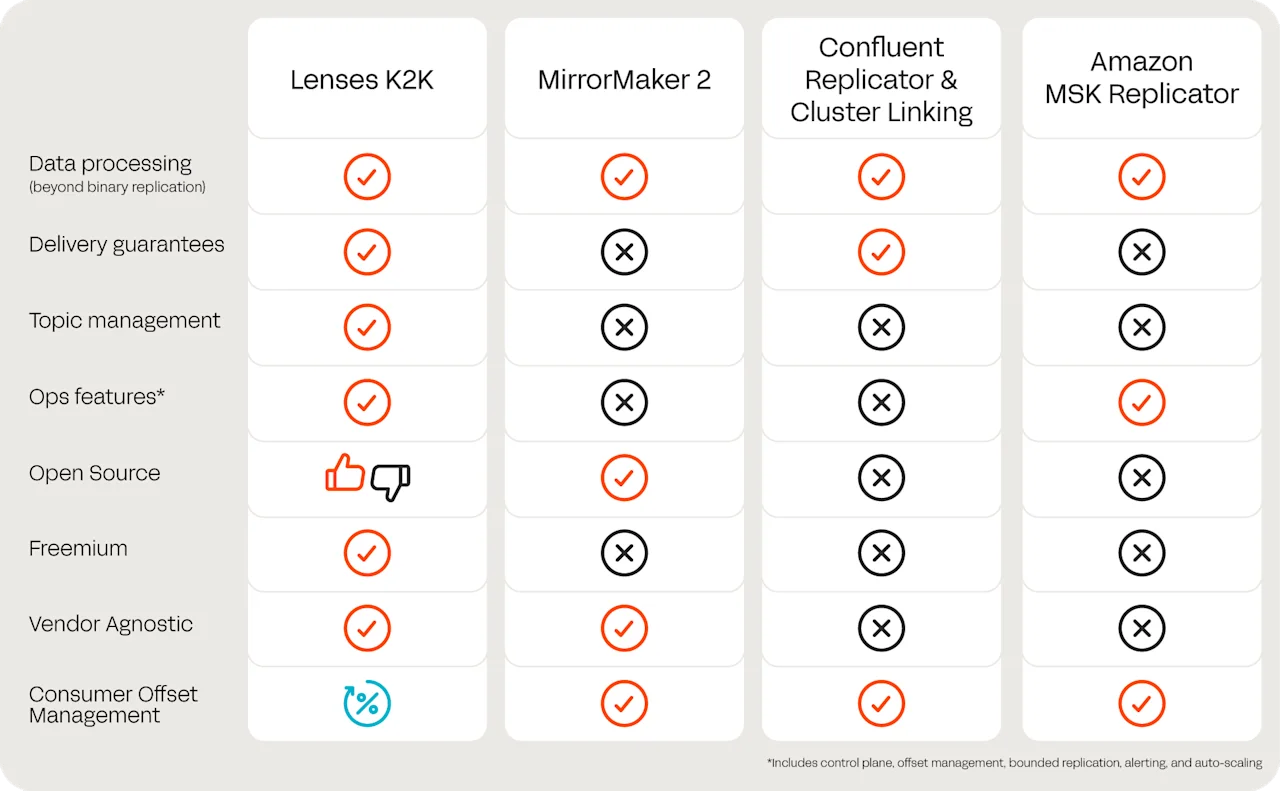Confident Kafka replication, complete autonomy
Kafka replication meant choosing between cloud providers and clunky operations. Until now.
Lenses K2K: universal, user-friendly,
Kafka replication
Lenses K2K is a new Kafka replicator that lets you share Kafka data between any clouds or platforms. No vendor lock-in. No technical barriers. Just simple, secure data replication that gives teams the freedom to work where they want, with the data they need.
Platform-neutral
Built for enterprises to replicate streaming data between vendors and domains. Run Kafka anywhere, with any provider – and share data across them.
User-friendly
Rich operational tooling, from full data transformation support, to management features like bounded replication, alerting, and auto-scaling.
Enjoy a fine-grained governance model that works across different clusters.
Technical support
Relies on native Kubernetes infrastructure. No Kafka Connect required.
Kafka replication will be included in the Lenses Multi-Kafka Developer Experience, available with enterprise support.
Lenses gave us the confidence to migrate to Confluent Cloud, and the migration overall has improved our engineering productivity by 20-30%.
Calculate your savings
Why Lenses K2K is different
- Lenses K2K Replicator: Advanced data manipulation, Kubernetes-native, platform-neutral.
- Apache MirrorMaker2 (MM2): Complex to configure & operate.
- Confluent Replicator: Part of Confluent ecosystem, but inherits MM2 complexity.
- Confluent Cluster Linking: Only works in Confluent Cloud.
- AWS MSK Replicator: Fully managed SaaS, vendor-specific (MSK only), no exactly-once or transformation & replication limited to single AWS account.

Demo Kafka migration
Companies replicate Kafka clusters for several reasons: disaster recovery and business continuity, data sharing between teams or external partners, vendor migration to avoid lock-in, workload migration between environments (on-prem to cloud), and data subsetting for testing with production-like data.
Read more >Kafka replication typically works by consuming messages from source topics and producing them to destination topics, often with additional features like schema registry synchronization, consumer offset translation, and topic configuration replication.
Read more >MirrorMaker 2 (MM2) is the open-source standard but requires complex Kafka Connect setup and lacks modern features. Commercial alternatives like Confluent Replicator offer support but inherit MM2's complexity. Cloud-native solutions like AWS MSK Replicator are easier but vendor-specific.
Read more >For K2K, yes. But not all other solutions do. While some tools like MirrorMaker 2 and Confluent Cluster Linking support exactly-once semantics, others like Confluent Replicator and AWS MSK Replicator do not, potentially leading to duplicate messages.
Read more >Lenses K2K automatically handles schema registry synchronization between clusters, including different schema registry types. It manages schema evolution and compatibility checks, supporting Avro, Protobuf, and JSON schemas.
Read more >Lenses K2K is a java-based application designed to run on Kubernetes, ideally close to the target Kafka cluster that you are replicating to.
The Lenses Developer Experience will help you identify the correct Kubernetes cluster to deploy to, and do all the deployment.
Read more >There is a free version that's restricted and accessible to download. A restricted version will also be included in Lenses Community Edition. For all enterprise features, you need to be a subscribed Lenses customer. Contact our teams for more information on pricing.
Request quote >K2K is available as a standalone container. But you will be responsible for the deployment, governance, and monitoring. We recommend the simplicity and power of managing K2K through the Lenses Developer Experience, found in Lenses 6.

